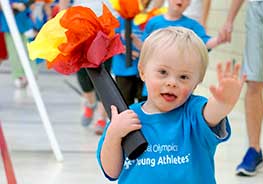At the first Special Olympics International Summer Games in 1968, Eunice Kennedy Shriver got down on the field during warm-ups. Shriver, the founder of Special Olympics, also loved being a coach. A few minutes after this picture was taken, she put on her bathing suit -- and helped athletes and coaches at the aquatics events.
From a backyard summer camp for people with intellectual disabilities to a global movement, Special Olympics has been changing lives and attitudes for 45 years.
It all began in the 1950s and early 1960s, when Eunice Kennedy Shriver saw how unjustly and unfairly people with intellectual disabilities (ID) were treated. She also saw that many children with intellectual disabilities didn’t even have a place to play. She decided to take action.
Soon, her vision began to take shape, as she held a summer day camp for young people with intellectual disabilities in her own backyard. The goal was to learn what these children could do in sports and other activities – and not dwell on what they could not do.
Throughout the 1960s, Eunice Kennedy Shriver continued her pioneering work — both as the driving force behind President John F. Kennedy’s White House panel on people with intellectual disabilities and as the director of the Joseph P. Kennedy Jr. Foundation. Her vision and drive for justice eventually grew into the Special Olympics movement.
In 1968, Mrs. Shriver organized the first International Special Olympics Games at Soldier Field in Chicago, in the belief that the lessons these athletes learned through sports would translate into new competence and success in school, in the workplace and in the community. Above all, Mrs. Shriver wanted the families and neighbors of people with intellectual disabilities to see what these individuals could accomplish, to take pride in their efforts and to rejoice in their victories.
Today, Special Olympics Inc. is the world’s largest provider of fitness training, education and athletic competition — coupled with social, life and leadership skill development opportunities — for children and adults with intellectual disabilities. Special Olympics Wisconsin, an accredited program of Special Olympics Inc., was founded in 1972 and is the largest sports program in Wisconsin for individuals with intellectual disabilities.
Special Olympics is a worldwide movement of more than 4.4 million athletes in 170 countries, where one can act locally, but make a global impact. With competitions around the world, daily training sessions and family leaders, athlete leaders and volunteers extending our message every day, Special Olympics is no longer just an event. We are a movement, inviting the world not only to attend Games but to think, feel and act differently about everything.
Join us – you will be helping to create a world of acceptance and inclusion for all!
Special Olympics Wisconsin Milestones
1969
Special Olympics Wisconsin holds its first state track meet in West Allis, with 200 athletes participating.
1972 (February)
Special Olympics Wisconsin (SOWI) is incorporated as a non-for-profit charitable organization under the laws of the state of Wisconsin.
1986
Wisconsin joins the Law Enforcement Torch Run® movement along with 42 other U.S. states by holding its first Final Leg in conjunction with the State Summer Games. Dale Brunner, Milwaukee Police Department serves as the first State Torch Run Director through 1999.
1989
Special Olympics Wisconsin introduces the Athlete Leadership Programs (ALPs).
1990
Special Olympics founder, Eunice Kennedy Shriver, attends SOWI Summer Games.
1999
Glendale athlete, Cindy Bentley, becomes the first ALPs athlete to be elected to the Special Olympics Wisconsin Board of Directors.
Wisconsin hosts its inaugural Polar Plunge® fundraising event at Lake Onalaska with 315 Plungers and raised more than $30,000.
2001
Wisconsin athlete and Global Messenger, Cindy Bentley, visits Greece to take part in the lighting of the official World Winter Games Torch. Milwaukee athlete, Michael Lunz, participates in the Torch Run in Alaska as one of the first athletes to ever be a torch runner with law enforcement officers. Later that year, Cindy presents President George W. Bush with one of her medals at the White House’s “Spirit of Special Olympics” event.
Milwaukee athlete Kelby Hall and his peer, Zer Her, attend the Global Youth Summit to discuss how to overcome the attitudes and stereotypes that students with ID face.
SOWI holds its first Healthy Athletes event, providing basic health care screenings to athletes at no cost. More than 350 athletes receive screenings and education on proper dental hygiene and the importance of a healthy diet. Prescription glasses are provided, in addition to custom-fit mouth guards for soccer athletes.
Special Olympics Wisconsin conducts its first Athletes-As-Coaches workshop for seven athletes and their mentors.
2003
Deputy Ray Merlin, Kenosha County Sheriff’s Department, represents Wisconsin’s law enforcement officers in the Law Enforcement Torch Run Final Leg for the 2003 Special Olympics World Summer Games from Athens, Greece to Dublin, Ireland.
Wisconsin’s Law Enforcement Torch Run® raises nearly $1.2 million statewide, with registered law enforcement participants reaching 1,239. Wisconsin receives awards for 5th highest funds per capita and 3rd largest program in the world.
2004
SOWI hires two Special Olympics athletes through a collaborative program with the Dept. of Public Instruction and AmeriCorps. It is the first and only known collaboration of its kind in the United States.
2005
Inspector Lorie Floyd, Wisconsin State Patrol, represents Wisconsin’s law enforcement officers in the Law Enforcement Torch Run Final Leg for the 2005 Special Olympics World Winter Games in Japan. Wisconsin sends three athletes to compete.
The Second Global Athlete Congress is held in Panama City, Panama. Wisconsin athlete, Travis Stuckart, joins athletes from more than 35 countries to discuss issues from competition management to athletes serving a more prominent leadership role in government relations and fundraising.
SOWI holds its first Athlete Youth Summit with nearly 20 participants. Students, age 8 to 17 with and without disabilities, come together to share their experiences with Special Olympics, including ways to reverse stereotypes about individuals with disabilities.
The first World’s Largest Truck Convoy® for Special Olympics Wisconsin is held, presented by Quad/Graphics with 104 trucks participating, raising $38,919 for athletes.
2006
The Law Enforcement Torch Run® for Special Olympics Wisconsin celebrates its 20th Anniversary, raising nearly $1.4 million statewide, with 1,253 registered law enforcement participating. Wisconsin receives the Diamond Level of Excellence, along with awards for 3rd highest funds per capita and 5th largest program in the world.
Corrections Officer Daryl Pries, Wisconsin Department of Corrections, represents Wisconsin’s law enforcement officers in the Law Enforcement Torch Run Final Leg for the first USA National Games in Iowa.
Special Olympics Wisconsin forms the Athlete Input Council.
2007
Special Olympics Wisconsin athlete Martha Hill is selected for the 2007-2009 International Global Messenger. She is one of three from the United States and 12 worldwide, charged with spreading the message of Special Olympics throughout the world.
SOWI athlete, Mila Holcombe, is selected to serve on the first ever R.I.S.E. Up Wisconsin!, (Ride to Inspire Student Engagement). AmeriCorps volunteers circled the state in a big yellow school bus to highlight the inspiring work of active youth and empower young people to work for change, become involved in their communities and make their voices heard.
Chief Lisa Walter, UW-Stout Police Department, represents Wisconsin’s law enforcement officers in the Law Enforcement Torch Run Final Leg for the 2007 Special Olympics World Summer Games in China. Wisconsin sends three athletes.
2008
SOWI holds its first Winter Camp Shriver. The Summer Camp Shriver is held in 2009.
SOWI joins the nationwide initiative to create schools of tolerance and acceptance through Project UNIFY.
2009
Sgt. Steve Janus, Wisconsin Department of Corrections, represents Wisconsin’s law enforcement officers in the Law Enforcement Torch Run Final Leg for the 2009 Special Olympics World Winter Games in Idaho. Wisconsin sends six athletes. Martha Hill serves as International Global Messenger.
SOWI recognizes Spread the Word to End the Word™, an effort to raise the consciousness of society about the negative effects of the word “retard(ed)”.
More than 200 children, ages three and four, participated in SOWI’s first Young Athletes Culminating Event at A.C. Kiefer Educational Center in Wausau.
2010
Special Olympics founder, Eunice Kennedy Shriver, passes away. She states, “Special Olympics is owned by the future, not by the past.”
Investigator Mark Mauthe, City of Menasha Police Department, represents Wisconsin’s law enforcement officers in the Law Enforcement Torch Run Final Leg for the 2010 USA National Games in Nebraska.
The statewide Youth Activation Committee (YAC) is created to provide youth voice and oversight to Project UNIFY.
2011
Through collaboration with the Wisconsin Dental Association (WDA), SOWI athletes with urgent dental needs attend the Mission of Mercy event in Wausau and receive free medical care. The WDA is the only state dental association nationwide that provides care to Special Olympics athletes at its Mission of Mercy events. Since 2011, an estimated $64,619 in restorative and preventive dental care has been provided to 113 special athletes at no cost to them, their families or SOWI.
Nichelle (Niki) Nelson, Waukesha Police Department, receives the Special Olympics Wisconsin Law Enforcement Torch Run® Volunteer of the Year Award presented at the annual Wisconsin Professional Police Association banquet.
The Law Enforcement Torch Run® for Special Olympics Wisconsin celebrates its 25th Anniversary.
Carolyn Voelker, Special Olympics Wisconsin athlete and Officer Kathy Schult, Milwaukee Police Department, represent Wisconsin in the LETR Final Leg at the 2011 Special Olympics World Summer Games in Athens, Greece.
Martha Hill, Special Olympics Wisconsin athlete, is recognized at the International LETR Conference in Calgary, Canada, as one of three inaugural recipients of the LETR International Executive Council Athlete Award.
2012
The R-word is removed from all state statutes and is replaced with the term “intellectual disability”.
Special Olympics Wisconsin holds its first Family Health Forum in Oshkosh. Throughout the day, speakers discussed topics about transitioning health care, nutrition and healthy relationships with participants.
2013
SOWI partners with the Department of Defense, to host the first annual Youth Activation Committee (YAC) and Athlete Input Council (AIC) retreat at Fort McCoy.
2014
432 Young Athletes from six Milwaukee Public Schools participate in the second annual Culminating Event at Marquette University and the first annual Young Athletes Special Smiles.
2015
The Youth Activation Committee hosts the Youth Activation Summit at the Wisconsin State Capitol where 74 middle & high school students and 28 advisors represented 18 schools and visited 132 legislator offices sharing the message of Project UNIFY on the national R-Word day.



